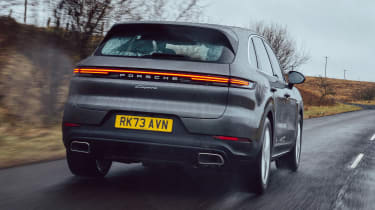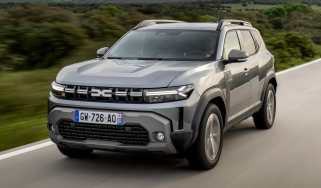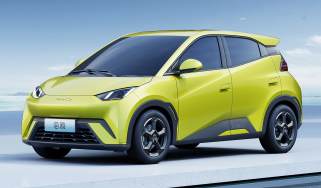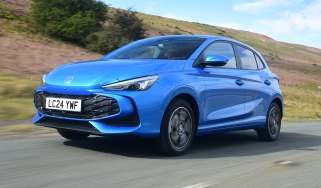New Porsche Cayenne E-Hybrid 2024 review: an almost perfect family SUV
Updates keep the Porsche Cayenne E-Hybrid at the front of the luxury SUV pack
Verdict
There’s a lot to like about the new Porsche Cayenne E-Hybrid. It’s quick, drives well, looks good and is well made – both inside and out. It’s also as clean as it is mean, which makes it hard to beat as an all-rounder, even at almost £80,000. It’s a shame it doesn’t have a seven-seat option or air suspension as standard – thus equipped it might well get five stars. But even as is, the Cayenne E-Hybrid is hard to fault.
As the transition away from fossil fuels becomes ever more complex, petrol-electric hybrid cars seem increasingly relevant in the here and now.
Driven right, a good hybrid emits precious little CO2 compared with a conventional petrol or diesel car, but still provides the flexibility, range and entertainment of the models we’ve been used to for the last century or so. Given that Porsche has been perfecting the art of hybridisation for over a decade now, it’s not surprising the new range of electrified Cayennes are right at the cutting edge.
They aren’t cheap, however. The entry-level E-Hybrid you see here costs £79,800 before options – of which, in true Porsche fashion, there are many to choose from. For your money, you get a restyled SUV that’s exquisitely well made, can hit 62mph in under five seconds, but which still emits just 33g/km of CO2, and returns a claimed 188mpg. Not a bad combination, even at almost £80k.
Those numbers arrive courtesy of a hybrid powertrain that mates a new 25.9kWh battery pack and e-motor, to a conventional 3.0-litre turbo V6 – providing a combined 463bhp and 650Nm of torque. The e-motor is good for 84mph all by itself, and although the electric range is a mere 46 miles – some way off a comparable BMW X5, for example – this is nearly double what you got before.
More reviews
Car group tests
- Porsche Cayenne vs BMW X5 2024 twin test: sporty plug-in hybrids battle for supremacy
- Audi SQ8 vs Porsche Cayenne Coupe GTS
In-depth reviews
Road tests
Charge times have almost halved, too. If you’ve access to 11kW three-phase electricity, the Cayenne will top up in just over two hours. Unlike the 75-litre fuel tank, which can of course be filled in seconds (albeit for a lot more money) to provide a real world combined range of around 400 miles.
Thanks to a range of modifications to its oily bits, the latest Cayenne is also one of the sharpest-driving big cars money can buy – with a four-wheel drive chassis that’s chock-full of technology to make it ride, steer, stop and handle as well as any large SUV on the market.
In this base E-Hybrid version you don’t get the air suspension (a £1,760 option) or four wheel-steering (£1,325) of the more expensive models. But if you can afford to do so, both are extras we’d recommend going for. When fitted, they enhance the Cayenne’s ride and handling significantly; on UK roads, where we drove the car, the extra sophistication of the air suspension alone is a virtually a must.
It also endows the E-Hybrid with far greater off-road capability, because it allows the ride height to be raised at the press of a button – by either 15mm or 45mm depending which setting you select. On the standard suspension the ride height is fixed.
Driven on a variety of UK roads, we found the E-Hybrid to be a quietly understated car. Its refinement is excellent and there’s a wide range of chassis settings (with the air suspension and 4WS fitted) that provide it with a serious breath of dynamic ability. It also has a smooth but undeniably strong turn of pace, which is mated to an eight-speed gearbox that’s just about faultless in its operation – in any of the five different drive modes.
The car’s no slouch (0-62mph takes 4.9 seconds in Sport Plus) but the performance is effective rather than addictive. In its Hybrid setting the ride is far smoother (adaptive dampers are standard-fit), and the V6 engine’s machinations less intrusive. But in any of its modes the engine doesn’t make a great noise, truth be told.
Of course, along with updates to the powertrain, Porsche has gently massaged the Cayenne’s aesthetic – changes that are particularly evident on the more conventional SUV version; the Coupe’s tweaks are more subtle. The result is a smarter exterior, plus some additional sparkle in the cabin.
It’s nothing extensive, but the improvements include a new 12.6-inch screen for the main instruments, plus the relocation of the drive selector to the left of the steering wheel. As such, the Cayenne now feels deliberately similar to the Porsche Taycan inside – a move designed to ease Cayenne drivers toward the fully-digital cockpits they’ll get, like it or not, when the brand’s flagship SUV becomes an electric car sometime in 2026.
Build quality, as we’ve touched on, is extremely good, although the lack of a seven-seat option will limit the Cayenne’s appeal beside rivals from BMW, Mercedes and Audi – even with a large load area that provides 627 litres with the seats up or 1,563 with them down.
The base specification is fairly generous for the money and includes 20-inch wheels and tyres, LED lights all round, Porsche’s famous Sports Chrono package, dual-zone climate control and Park Assist. Other notable options include a panoramic sunroof at £1,509 and an electronically extendable tow bar for £945.
Other variants, including non-plug-in V6 or V8s, and a pair of more powerful PHEVs are also available, with prices ranging from £70,400 to £130,200.
| Model: | Porsche Cayenne E-Hybrid |
| Price: | £79,800 |
| Engine: | 3.0-litre V6 turbo petrol PHEV |
| Power/torque: | 463bhp/650Nm |
| Transmission: | Eight-speed auto, all-wheel drive |
| 0-62mph: | 4.9 seconds |
| Top speed: | 158mph |
| Economy/CO2: | 188.3mpg/33g/km |
| Dimensions (L/W/H): | 4,930/2,194/1,696mm |
| On sale: | Now |





